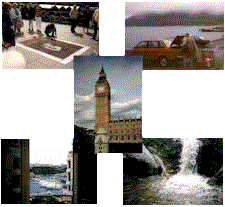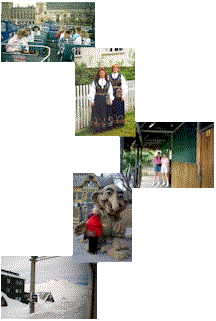|
|
|
|
With the speed, ease, and affordability of modern transportation,
American tourists are traveling outside the U.S. more than ever.
As they travel to far off lands, some expect everything to be the
same as home except for the scenery. They are sometimes surprised
and often shocked at what they find. Some of these American
tourists are unprepared for a new culture and are often looked
upon as rude or foolish in the eyes of the natives. |

|
|

|
One common but foolish idea the American tourist has is that the
English language is more common than it is. An example of this
is with a friend of mine on her first trip outside the U.S. We
had just arrived at the Amsterdam Airport, and we were
attempting to reconfirm our hotel reservation. We had problems
with the phone located at the airportís baggage area, so we
looked for assistance. My friend asked one of the porters if he
spoke English. He politely replied "no." She proceeded
to slap the man on the arm and say, "Oh yes you do!
Otherwise you would not be able to answer me?" The poor man
was shocked and looked at me with a look of, "Get this
crazy lady away from me!"
|
|
Another example of unreasonable language expectations happened
while I was in Paris. A group of eight of us had taken a night
cruise on the Seine River. It was a beautiful fall evening, and
the city lights were beautiful. The cruise company had
accommodated us with an English speaking guide since there were
so many of us that spoke English. To our groupís
embarrassment, one of the women from our group complained to the
boat staff that she could not understand the guideís heavy
French accent. She asked if we could get a better
English-speaking guide. Unfortunately, a group of young French
people overheard this, and they proceeded to harass us for the
rest of the cruise.
|

|
|

|
It is usually considered a great compliment when we attempt to
speak the language of the country we are visiting. This should
only be done with caution, and is usually best accompanied by a
bilingual dictionary because many words sound similar. However,
a bilingual dictionary would not have helped me in my
embarrassing situation. I was visiting with my non-English
speaking relatives in Poland. I was alone with my cousinís
3-year-old daughter, who was playing ball. I asked her in Polish
"please" for her to toss me the ball. She gave me a
strange look and had no intentions of playing with me. I found
out later that the Polish words for "please" and
"little pig" sounded very much alike, and my
pronunciation was not correct!
|
|
Another rude thing that American tourists will often do is turn
their noses up at foreign cuisine. When traveling through a
foreign open food market, donít wrinkle your nose when you see
some strange meat or fish that you would never consider eating.
How would you feel if someone insulted your lifeís work? How
can tourists truly experience a foreign culture if they are not
willing to try something different? On the same trip to Paris,
one of the men in our group ate all of his meals at McDonaldís
except for one night when he ate a hamburger at the Hard Rock
Cafe! How do you know that you wonít find a new favorite food?
I would not say that the greasy crocodile and the tough ostrich
meat in South Africa were my favorites, but Iím glad I had the
opportunity to try them!
|

|
 |
Many natives of foreign countries are aware of the American
touristsí fear of uncommon cuisine. There might be some times
when a native might have fun with you, especially if you are far
away from your usual settings. I had the opportunity to spend
two nights in a grass and bamboo resort off the Amazon River in
Peru. The resort had no electricity and the only way of getting
there was by boat. The guests at this resort had no choice of
what they were going to eat. At my first meal,
the waiter set a
plate in front of me with a rice and vegetable mixture and some
dark meat. I asked our guide what type of meat it was. He told
me it was monkey meat! Knowing that our guide was a bit of a
practical joker, I took a bite of it and told him that I swore
it had just "mooed." Everyone at the table including
our guide laughed at his failed attempt to fool me. The next day
when a couple of men from Austria arrived, they asked us what
was served for dinner the night before. My friend and I told him
that we had been served monkey meat. The Austrian men were
completely amazed and believed every word we told them. We
noticed our guide sitting on the side of the lobby holding his
stomach from laughing so hard.
|
|
Another important thing American tourists can do before they
leave for a foreign country is to be prepared to use the
restrooms! Although it is common in most large foreign cities to
use universal signs to tell us for which gender the restroom is,
this may not be true everywhere. For example, it could be very
embarrassing for a woman traveling in Germany if she enters the
door with an "H" on it. In Germany, the "H"
stands for "Herren," which means "Menís"
not "Herís!" It is also common in many places in
Europe to have pay toilets. It is helpful to keep some of the
local currency in coins with you. I had a friend who was forced
to try to exchange $1 to use the restroom at the train station
right before leaving Norway. Fortunately, they were kind enough
to let her use their office restroom. Some Americans also prefer
to carry some of their own toilet paper since some of the paper
abroad might not have the same "cush!"
|
 |
 |
It is my opinion that American tourists should be prepared for
what is ahead for them. They should ask questions of those who
have traveled to where they intend to go. They should read
travel guides and find out as much as they can about the
country. Most importantly, they should have an open mind and
accept the other culture as their own. "When in Rome, do as
the Romans do!" This is a simple quote but can make a big
difference in being an intelligent and courteous traveler. And
remember, when asking a Bulgarian if he speaks English, if he
nods his head "yes," it means "no" in
Bulgaria!
|

[Main
Page] [Stories]
[Professional Blunders] [If Airlines Sold
Paint]
[Crazy American Tourist] [Travel News] [Other Humor Links] [Contact
Us]
|